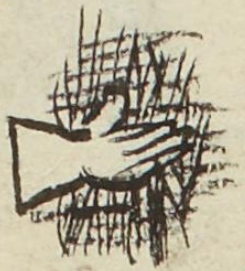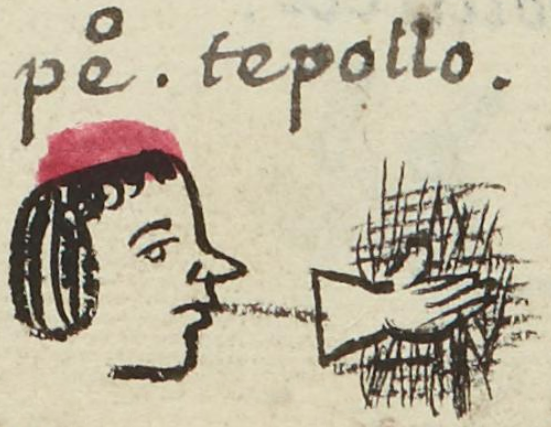Tepolo (MH672v)
This black-line drawing of the simplex glyph for the personal name Tepolo (perhaps "He Defeated People in War") is attested here as a man’s name. The glyph shows a hand grasping or some kind of material that resembles a mesh of grass or sticks. This visual seems to relate better to the verb, tzontepoloa (to gather or cut spikes by hand). If so, then this is a phonetic indicator for Tepolo (or Tepoloh, with the glottal stop).
Stephanie Wood
The noun tzontli can also refer to hair, and perhaps the verb tzonpoloa can be a metaphor for the gathering of hair from the enemy in war.
Stephanie Wood
1560
Jeff Haskett-Wood
manos, apartado, perdido, nombres de hombres

tepoloa, to defeat people in war, https://nahuatl.wired-humanities.org/content/tepoloa
tzontepoloa, to harvest or cut spikes by hand, https://nahuatl.wired-humanities.org/content/tzontepoloa
tzon(tli), hair or head, https://nahuatl.wired-humanities.org/content/tzontli
tepolo (or tepoloh, showing the glottal stop), someone who is lost or separated, or a victor in war, https://nahuatl.wired-humanities.org/content/tepolo
tepoloani, victor in war, https://nahuatl.wired-humanities.org/content/tepoloani
poloa, to destroy, https://nahuatl.wired-humanities.org/content/poloa
te-, nonspecific human object prefix, people, https://nahuatl.wired-humanities.org/content/te
Alguien Perdido, o Apartado
Stephanie Wood
Matrícula de Huexotzinco, folio 672v, World Digital Library, https://www.loc.gov/resource/gdcwdl.wdl_15282/?sp=425&st=image.
This manuscript is hosted by the Library of Congress and the World Digital Library; used here with the Creative Commons, “Attribution-NonCommercial-ShareAlike 3.0 License” (CC-BY-NC-SAq 3.0).







